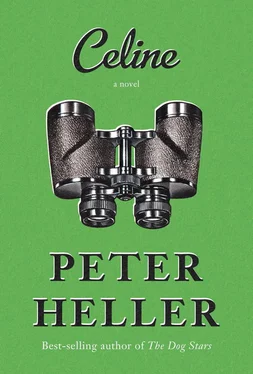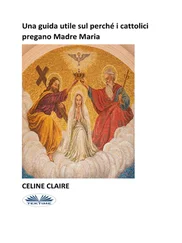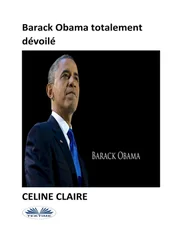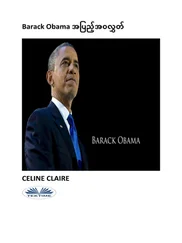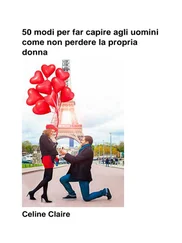“Why rainy nights?”
“Because on clear summer nights we were out frogging, or fishing with lights, or playing these big games of kick the can in the Beveridge cemetery.”
“Was Norman Rockwell on-site? Or were those reenactments?”
“You’re making me lose my train of thought.”
Celine considered her husband’s upbringing and felt again the pang that those with imperfect childhoods feel when confronted with one that seems idyllic. Or even normal. She marveled once more that his youth seemed to her so exotic, when she was the one raised in Paris who fled the Nazis on an ocean liner. Salvador Dalí was on her passage. She remembered him, he had a pair of ocelots on jewel-studded leashes, imagine.
“I’m sorry. You were talking about card games.”
“Gabriela ignored the homework and tried to get her father to play canasta because even three sheets to the wind he was a competitive sonofabitch and canasta can be a very long game. She wanted him to stay with her as long as possible.”
Celine lit up. “We used to play it on Fishers! Same strategy: The longer the game, the more time Mummy would spend with us, and the later we could stay up.”
Pete nodded. “She told me that she also visited her father upstairs. She would listen for the heavy clomp of Danette’s clogs on the steps going down—Gabriela said she was sexy but not at all graceful—and she’d go up. She said she took little Jackson with her once, but only once because Danette came home and found cat hairs on the couch and freaked out. Gabriela said she was afraid her stepmother would get rid of the cat while she was at school. Ended up that Jackson took care of that all by himself.”
“Whew.” Celine could hardly bear it, the story. The predicament. Her finely tuned sense of empathy vibrated and hummed. It was the harmonic that ruled her life. The small child was visited by her father like someone in a prison, or a hospital. Or worse, a mental ward. What is wrong with me? Gabriela must have asked herself again and again. She knew that Danette was jealous of her, her and her dead mother, Amana, but the kind of isolation she experienced gets internalized. Especially by children.
“Another thing,” Pete said. “When they visited and he was warmed up, which was pretty much all the time, he would tell her this fairy tale that he’d made up: He said that way far north, up on the Canadian border, there was an Ice Mountain, and a lake the color of his true love’s eyes, and there was a castle there for princesses and their families and he would take her there. He said the lake sounded like birds and the mountain was the king of mountains.”
“I want to hate him,” she said, “but somehow I can’t.”
“That’s just it. And what I’m getting to. He must have known right away. He was not insensible, as I said. He was too sensitive. What I’m learning about the man. He was too heartbroken. He could not face life on life’s terms after his wife’s death. He tried every way: alcohol, immersion in work, travel, a plunge into an obsessive sexual affair that he allowed, unfortunately, to become a marriage. I imagine that Danette got him warmed up one afternoon and screwed his lights out and dragged him down to city hall. So there he was. Trapped first by overwhelming grief and then by marriage. And he was—really trapped.”
“How do you mean? Was there a prenup?”
Pa let out one of his soft hums, part amusement, part pathos. He loved that his wife could often be a step ahead of even him.
“Yes there was. She wrote it, not him. Gabriela sued to see it after he disappeared. Lamont had not inconsiderable income from the royalties of a handful of his iconic pictures, which are everywhere. But, as you seem to anticipate, the prenup undid and reversed the usual protections. I mean that we think of a prenup as usually entered into in order to protect the rights of the party with a disproportionate share of assets. Well. It also protects the other, the one who has much less, in that it often stipulates a schedule of payments in the case of a divorce—so much after so many years of marriage, so much more after more time. But get this. This prenup said… let me see if I can remember the wording… ‘In light of the fact that the grantee’—that’s Danette—‘has eschewed numerous lucrative marital options in favor of marriage to the grantor’—that’s Paul Lamont—‘this agreement, legally binding under the laws and statues of the State of California, lays out the following terms…’”
Celine was wide awake. Unconsciously she was stirring her coffee, which didn’t need stirring.
“You’ve got to be kidding!” she cried.
“No. Not kidding.”
“In plain English,” Celine averred, “it was saying that because she screwed so many surgeons in the broom closet and had them dead to rights in one way or another, and could have had her choice of a gaggle of rich doctor husbands—if Lamont ever divorced her she would pick his bones. Clean him out! Unbelievable.”
“Yep.”
“That’s legal ? I mean some lawyer actually typed out those words. My God.”
Sometimes in the middle of the night when Pa couldn’t sleep, which wasn’t often, he liked to think about all the jobs there were in the world. He liked to take a tour of the workbenches in China or India where nimble-fingered women who would never see a free-running brook, much less a trout stream, tied fishing flies. He imagined someone cementing the gargoyles to the ledges of reconstructed churches. Someone adjusting the compasses that now come with cars. He could imagine many both wonderful and cruel jobs but he could barely imagine the conversation in some cluttered legal office—probably just like those in the warrens of the hack lawyers up on Court Street—that led to the crafting of those lines. Man.
“The terms set forth, needless to say, were draconian. Gabriela said she probably got him drunk and worked him up right to the threshold, so to speak, of sex, and then made him sign it. Most of his net worth was tied up in the upstairs apartment, the one the two lived in. If he were ever to initiate divorce she would get the place, plus half the value of the cash and stocks he had on the date of union. Lamont had bought the apartment outright after selling a coffee-table book on the wild horses of Monument Valley. You’ve seen the pictures, some of the most iconic wildlife pictures ever taken. And there is the famous one you see everywhere of the fishing boat cresting the giant wave. Gabriela is still partly living on the royalties and subsidiary rights. As I said, they are not inconsiderable.”
“Danette would have gotten those, too.”
“That’s right. But not if he died.”
They sat in silence. The Dixie Chicks were wailing out “Travelin’ Soldier.” “I need fresh air, Pete,” Celine said. “There was a bench by the door. It’s not so cold.”
They paid the check and buttoned up their coats. It was cold. They shoved open the heavy door and went back out into the chill night. Because it was night now and moonless and ranks of heavy clouds had marched over the country in just the last hour, and the stillness smelled heavy with rain. Not a single star. Still, the fresh air was clean and good.
Pete held her hand and they sat. “You were saying about what happened if Lamont died,” she said.
Pa nodded. “Danette thought she had that covered too. Gabriela said she was practically licking her lips at the unsealing of the will in the lawyer’s office on Howard Street.”
“Ha.”
“Yep. She gave Gabriela a look like, ‘You poor thing. I’ve seen the will. You’ve always lost out in the battle for his affections, and you are going to lose out now big-time.’ Gabriela told me she would not have been surprised if Danette had whispered, ‘Don’t worry, I’ll send you a card from Acapulco, sucker.’”
Читать дальше
